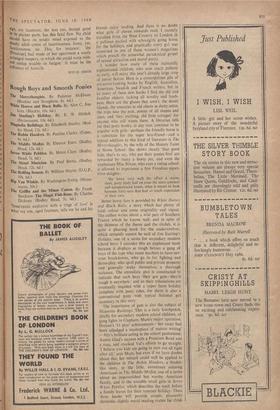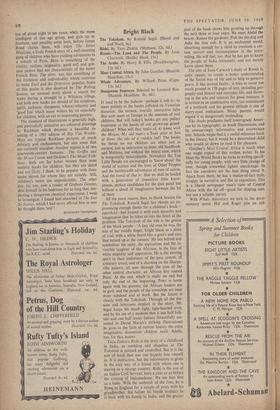Rough Boys and Smooth Ponies T he Merrythoughts. By Patience McElwee.
„.„ (Hodder and Stoughton, 8s. 6d.)
white Horses and Black Bulls. By Alan C. Jen- 30n Starling's Holiday. By. E. W Hildick. 30n Starling's Holiday. By. E. W Hildick.
(Heinemann, I Os. 6d.)
ley Head, 12s. bd.) ley Head, 12s. bd.) 9s. 6d.)
Head, Its. 6d.) Head, Its. 6d.)
Seven White Pebbles. By Helen Clare. (Bodlcy
Head, 7s. 6d.) Head, 12s. 6d )
The Rolling Season. By William Mayne. (O.U.P., mann, 30s.) mann, 30s.) The Griffin and the Minor Canon. By Frank Stockton. The Magic Fish-Bone. By Charles Dickens. (Bodley Head, 7s. 6d.)
‘SomEntiNct explosive with a tinge of love' is What my son, aged fourteen, tells me he and his friends enjoy reading. And there is no doubt what girls of eleven onwards read. I recently travelled from the West Country to, London in a pullman packed with schoolgirls going home for the holidays, and practically every girl was immersed in one of those women's magazines which preach the somewhat paradoxical gospel of sexual attraction and moral purity.
I wonder how many of these outwardly sophisticated children, who now reach puberty so early, will enjoy this year's already large crop of junior fiction. Here is a cosmopolitan pile of attractive-looking books by English. Australian. American, Swedish and French writers, but in so many of these new books I find the old and familiar objects, lacking all novelty and fresh- ness. Here are the ghosts that aren't, the desert islands, the treasures in old chests in dusty attics, the trips into the past, ponies of all shapes and sizes, and 'tiny, exciting, old little cottages' for anyone who still wants them. A librarian tells me that pony books, at any rate, continue to be popular with girls-perhaps the friendly horse is a substitute for the super boy-friend and a typical addition to this kind of literature is The Merrythoughts, by the wife of the History Tutor at Stowe School. She shows clearly 'that good kids, that's to say, who put their ponies first' are rewarded by many a horsy joy, and even the unpleasant Miss Nixon, who runs a riding school, is allowed to experience a few Freudian eques- trian delights:
She knew very well the effect a warm. sleek, pony body had on even the most amateur and inexperienced knees, what it meant to look between furry ears that had so much expression of their OW11.
Better horsy fare is provided by White Horses (ofd Black Bulls, a story which has plenty of local colour and some originality and vigour. The author writes about a wild part of Southern France which he knows well, and in spite of the thinness of the theme and the cliches, it is quite a pleasing book for the under-twelves. which certainly cannot be said of lint Starling's Holiday, one of a series for secondary modern school boys. I consider this an unpleasant book because it displays as tough heroes a gang of boys of the type who cause teachers to have ner- vous breakdowns,, who go in for lighting and horse-play, who spoil public and private property and generally make themselves a thorough nuisance. The unrealistic plot is constructed to indicate that such boys 'they got guts-they'd rough it anywhere,' and so their tribulations are eventually requited with a super farm 'holiday complete with pony rides, for there is also a conventional pony with typical fictional girl accessory in this story.
The importance of guts is also the subject of Magnolia Buildings. This is a tasty hotchpotch, chiefly for secondary modern school children, of gang fights in Clapham, Mum's major operation, Doreen's I plus' achievements---'her essay had been adjudged a masterpiece of mature writing' -Ally's brilliant acting in the school pantomime, Auntie Glad's success with a Premium Bond and a man, and crooked Val's efforts to go straight. 'I believe you kids are going to turn out all right after all,' says Mum, but even if we have doubts about this, her remark could well be applied to the children in The Robin Hooders, a Nesbit- like story, to the little, sometimes amusing Americans in The Middle Moffat, one of a series about an impoverished but worthy American family, and to the amiable small girls in Seven White Pebbles, which describes the week before a family leaves for their summer holiday. These three books will provide simple, pleasantly domestic, slightly moral reading matter for child- ren of about eight to ten years, while the more intelligent of this age group, and girls up to fourteen, and possibly some boys, before James Bond claims them, will enjoy The Street Musician, a lively French story of a well-meaning gang of children who have exciting adventures in a suburb of Paris. Here is something of the vitality, realism, originality, good will and gen- uine pathos that are characteristic of the better French films. The story too, has something of the freshness and individuality which continue to make Emil and the Detectives popular. Some of this praise is also deserved by The Rolling Season, an unusual story about a search for water during a drought in a Wiltshire village, and both new books are devoid of the simplesse, uplift, archness, cheapness, whimsy-whamsy and `good fun' which many writers lay on especially for children, with an eye to impressing parents.
The standard of illustrations is generally high, and particularly attractive are coloured drawings by Rackham which decorate a beautiful re- setting of a 1905 edition of Rip Van Winkle. Here are typical Rackham pictures of much delicacy and enchantment, but also some that are curiously macabre. Another reprint is of two nineteenth-century fantasies: The Griffin and the Minor Canon and Dickens's The Magic Fish- bone. Both are far better written than most modern books for children, but they are dated and not likely, I think, to be popular with those under eleven for whom they are suitable. Still, children's tastes are unpredictable. The other day, my son, now a reader of Graham Greene, shut himself in his bedroom for so long that, sus- pecting a dangerous chemical experiment, I went to investigate. I found him absorbed in The lust So Stories, which I had never offered him in case he thought them 'wet'!
ROSEMARY THOMPSON











































 Previous page
Previous page